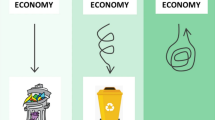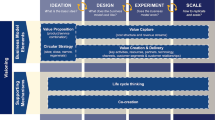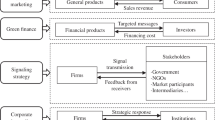Abstract
Promoting corporate carbon reduction is key to achieving sustainable development, and carbon trading policies are important institutional choices for governments of various countries to promote green development and actively respond to climate change. This paper constructs a tripartite evolutionary game model involving the government, high-carbon emission manufacturers and carbon quota suppliers, and subsequent simulation analyses were conducted. The main results of the study are as follows: (1) The evolutionarily stable strategy (ESS) of the three stakeholders is as follows: loose regulation by the government, active emission reduction by manufacturers, and in-chain trading by suppliers. (2) The increase of excess carbon emissions inhibits manufacturers’ choice of active emission reduction and suppliers’ choice of in-chain trading and promotes the government’s choice of strict regulation. Strict government regulation can improve the degree of cooperation between manufacturers and suppliers to achieve carbon reduction targets at a faster speed. (3) There is a critical value for the probability of manufacturers actively reducing emissions. Above this critical value, suppliers tend to choose off-chain transactions, otherwise, suppliers tend to choose in-chain transactions. The results of this study can serve as a reference for the decarbonization path of supply chain member enterprises and offer valuable suggestions for the government to achieve a low-carbon society.

















Similar content being viewed by others
Availability of data and materials
No data was used for the research described in the article.
References
Bang, G., Victor, D. G., & Andresen, S. (2017). California’s cap-and-trade system: Diffusion and lessons. Global Environmental Politics, 17(3), 12–30. https://doi.org/10.1162/GLEP_a_00413
Benjaafar, S., Li, Y. Z., & Daskin, M. (2013). Carbon Footprint and the management of supply chains: Insights from simple models. IEEE Transactions on Automation Science and Engineering, 10(1), 99–116. https://doi.org/10.1109/tase.2012.2203304
Conlisk, J. (1996). Why bounded rationality? Journal of Economic Literature, 34(2), 669–700. https://doi.org/10.4337/9781788974912.B.42
Dobos, I. (2005). The effects of emission trading on production and inventories in the Arrow–Karlin model. International Journal of Production Economics, 93, 301–308. https://doi.org/10.1016/j.ijpe.2004.06.028
European Commission. (2010). EU emissions trading system. Retrieved June 18, 2018, from https://climate.ec.europa.eu/eu-action/eu-emissions-trading-system-eu-ets_en
Feng, T. T., Gong, X. L., & Yang, Y. S. (2019). Carbon emission trading market in China: Operation mechanism and development path. Ekoloji, 28(107), 3417–3427.
Friedman, D. (1991). Evolutionary games in economics. Econometrica, 59(3), 637–666. https://doi.org/10.2307/2938222
Friedman, D. (1998). On economic applications of evolutionary game theory. Journal of Evolutionary Economics, 8(1), 15–43. https://doi.org/10.1007/s001910050054
Garbaccio, R. F., Ho, M. S., & Jorgenson, D. W. (1999). Why has the energy-output ratio fallen in China? Energy Journal, 20(3), 63–91. https://doi.org/10.5547/ISSN0195-6574-EJ-Vol20-No3-3
Gottinger, H. W. (1998). Greenhouse gas economics and computable general equilibrium. Journal of Policy Modeling, 20(5), 537–580. https://doi.org/10.1016/s0161-8938(97)00074-4
Hassiba, R. J., & Linke, P. (2017). On the simultaneous integration of heat and carbon dioxide in industrial parks. Applied Thermal Engineering, 127, 81–94. https://doi.org/10.1016/j.applthermaleng.2017.07.157
Huang, L., & Dong, Y. (2022). Evolutionary game analysis on low carbon transformation of supply chain under government constraint and incentive policy. Journal of Heilongjiang University of Technology (comprehensive Edition), 22(4), 115–121. https://doi.org/10.16792/j.cnki.1672-6758.2022.04.020
Jiang, J., Xie, D., Ye, B., Shen, B., & Chen, Z. (2016a). Research on China’s cap-and-trade carbon emission trading scheme: Overview and outlook. Applied Energy, 178, 902–917. https://doi.org/10.1016/j.apenergy.2016.06.100
Jiang, W., Liu, J., & Liu, X. (2016b). Impact of carbon quota allocation mechanism on emissions trading: An agent-based simulation. Sustainability. https://doi.org/10.3390/su8080826
Jiao, J., Chen, J., Li, L., & Li, F. (2017). A Study of local governments’ and enterprises’ actions in the carbon emission mechanism of subsidy or punishment on the evolutionary game. Chinese Journal of Management Science, 25(10), 140–150. https://doi.org/10.16381/j.cnki.issn1003-207x.2017.10.015
Lan, Z., Sun, Z., & Cai, L. (2019). Evolutionary game of green innovation investment in supply chains under low carbon development. Science and Technology Management Research, 39(16), 257–263.
Li, J., Su, Q., & Ma, L. (2016). The research of carbon trading model on supply chain under carbon emission constraints. Chinese Journal of Management Science, 24(4), 54–62. https://doi.org/10.16381/j.cnki.issn1003-207x.2016.04.007
Li, J., & Tao, S. (2022). Carbon emission trading mechanism, media pressure, and enterprise green technology innovation. Communication of Finance and Accounting, 43(19), 69–74. https://doi.org/10.16144/j.cnki.issn1002-8072.2022.19.021
Li, X., & Zhou, J. (2022). Incentive of professional manager and strategy selection of carbon emission reduction R & D in a two-echelon supply chain. Chinese Journal of Management Science, 19(7), 1071–1081.
Lugovskyy, V., Puzzello, D., Sorensen, A., Walker, J., & Williams, A. (2017). An experimental study of finitely and infinitely repeated linear public goods games. Games and Economic Behavior, 102, 286–302. https://doi.org/10.1016/j.geb.2017.01.004
Mnif, W., & Davison, M. (2011). What can we learn from the EU ETS experience? Recommendations for effective trading and market design. Environmental Economics eJournal. https://doi.org/10.2139/ssrn.1843543
Montgomery, W. D. (1972). Markets in licenses and efficient pollution control programs. Journal of Economic Theory, 5(3), 395–418. https://doi.org/10.1016/0022-0531(72)90049-X
Pang, Q., Li, M., Yang, T., & Shen, Y. (2018a). Supply chain coordination with carbon trading price and consumers’ environmental awareness dependent demand. Mathematical Problems in Engineering, 2018(PT.3), 1–11. https://doi.org/10.1155/2018/8749251
Pang, Q. H., Li, M. Z., Yang, T. T., & Shen, Y. (2018b). Supply chain coordination with carbon trading price and consumers’ environmental awareness dependent demand. Mathematical Problems in Engineering. https://doi.org/10.1155/2018/8749251
Schmidt, T. S., Schneider, M., Rogge, K. S., Schuetz, M. J. A., & Hoffmann, V. H. (2012). The effects of climate policy on the rate and direction of innovation: A survey of the EU ETS and the electricity sector. Environmental Innovation and Societal Transitions, 2, 23–48. https://doi.org/10.1016/j.eist.2011.12.002
Shanghai Environment and Energy Exchange. (2020). Shanghai carbon market report 2019. Retrieved May 14, 2020, from https://www.cneeex.com/tpfjy/xx/yjybg/tscbg/
Shao, B., & Hu, L. (2021). A game analysis of the evolution of participation behavior of green supply chain—A study based on the system dynamics perspective. Science Research Management, 42(11), 171–181. https://doi.org/10.19571/j.cnki.1000-2995.2021.11.020
Smith, J. M., & Price, G. R. (1973). Logic of animal conflict. Nature, 246(5427), 15–18. https://doi.org/10.1038/246015a0
Song, Z., Zhou, Y., & He, Q. (2011). The unequal aversion and the voluntary provision of public goods—A preliminary research based on experimental economics. Journal of Management World, (12), 32–39+54+187. https://doi.org/10.19744/j.cnki.11-1235/f.2011.12.004
Song, H., Zhu, J., & Dai, Y. (2015). Sharing mechanism of surplus carbon emission quota in supply chain enterprises under imperfect carbon trading market. Computer Integrated Manufacturing Systems, 22(9), 2217–2226. https://doi.org/10.13196/j.cims.2016.09.018
Wang, C., & Li, X. (2014). Design of internal carbon trading model for large enterprises. Modern Business, 9(21), 231–234. https://doi.org/10.14097/j.cnki.5392/2014.21.011
Wang, M., Zhao, L. D., & Herty, M. (2018). Modelling carbon trading and refrigerated logistics services within a fresh food supply chain under carbon cap-and-trade regulation. International Journal of Production Research, 56(12), 4207–4225. https://doi.org/10.1080/00207543.2018.1430904
Wang, P., Dai, H., & Zhao, D. (2014). Assessment of Guangdong carbon emission trading based on GD_CGE model. Acta Scientiae Circumstantiae, 34(11), 2925–2931. https://doi.org/10.13671/j.hjkxxb.2014.0707
Wang, X., Gu, C., He, Q., & Zhao, J. (2022). Evolutionary game analysis on credit market of supply chain finance. Operations Research and Management Science, 31(1), 30–37. https://doi.org/10.12005/orms.2022.0005
Wei, D., Yue, J., & Wang, J. (2012). The identification, assessment and response of carbon emission trading risk management. China Population, Resources and Environment, 22(8), 28–32.
Wu, K., Bai, E., Zhu, H., Lu, Z., & Zhu, H. (2023). A tripartite evolutionary game behavior analysis of the implementation strategy of the internal carbon pricing of enterprises under governments supervision Heliyon, 9(12). https://doi.org/10.1016/j.heliyon.2023.e23131
Xia, L., Bai, Y., Qin, J., & Li, Y. (2018). Supply chain’s emission reduction and lowcarbon promotion policies in cap-and-trade system: The view of information asymmetry. Operations Research and Management Science, 27(6), 37–45. https://doi.org/10.12005/orms.2018.0132
Xia, X., Lu, M., & Xu, C. (2022). Studying on the impact of carbon trading on manufacturing/remanufacturing and coordination mechanism based on authorization manufacturing. Operations Research and Management Science, 31(5), 136–142.
Xing, E., Shi, C., Zhang, J., Cheng, S., Lin, J., & Ni, S. (2020). Double third-party recycling closed-loop supply chain decision under the perspective of carbon trading. Journal of Cleaner Production. https://doi.org/10.1016/j.jclepro.2020.120651
Yi, W. J., Zou, L. L., Guo, J., Wang, K., & Wei, Y. M. (2011). How can China reach its CO2 intensity reduction targets by 2020? A regional allocation based on equity and development. Energy Policy, 39(5), 2407–2415. https://doi.org/10.1016/j.enpol.2011.01.063
Zhang, J., Gao, T., Fu, F., & Fang, Y. (2022). The evolutionary game of environmental co-governance in cross-regional supply chain under financial constraints. Ecological Economy, 38(5), 203–214.
Zhang, J., Wang, Z., Tang, L., & Yu, L. (2016). The simulation of carbon emission trading system in Beijing–Tianjin–Hebei Region: An analysis based on system dynamics. Chinese Journal of Management Science, 24(3), 1–8. https://doi.org/10.16381/j.cnki.issn1003-207x.2016.03.001
Zhang, Y. J., & Wei, Y. M. (2010). An overview of current research on EU ETS: Evidence from its operating mechanism and economic effect. Applied Energy, 87(6), 1804–1814. https://doi.org/10.1016/j.apenergy.2009.12.019
Funding
This work was supported by the National Social Science Fund of China (Grant no. 18BGL182).
Author information
Authors and Affiliations
Contributions
Wei Jie provided the direction and gave guidance to the paper. Li Yining conducted the analysis of the evolutionary game and data simulation, and was a major contributor to the manuscript writing. Liu Yushun determined the content including background, object, method of the research in the early stage of the manuscript. All authors read and approved the final manuscript.
Corresponding author
Ethics declarations
Conflict of interest
The authors have no relevant financial or non-financial interests to disclose.
Ethical approval
Not applicable.
Consent to participate
All authors participated in this article.
Consent to publish
All authors have given consent to the publication of this article.
Additional information
Publisher's Note
Springer Nature remains neutral with regard to jurisdictional claims in published maps and institutional affiliations.
Rights and permissions
Springer Nature or its licensor (e.g. a society or other partner) holds exclusive rights to this article under a publishing agreement with the author(s) or other rightsholder(s); author self-archiving of the accepted manuscript version of this article is solely governed by the terms of such publishing agreement and applicable law.
About this article
Cite this article
Wei, J., Li, Y. & Liu, Y. Tripartite evolutionary game analysis of carbon emission reduction behavior strategies under government regulation. Environ Dev Sustain (2024). https://doi.org/10.1007/s10668-024-04972-0
Received:
Accepted:
Published:
DOI: https://doi.org/10.1007/s10668-024-04972-0




